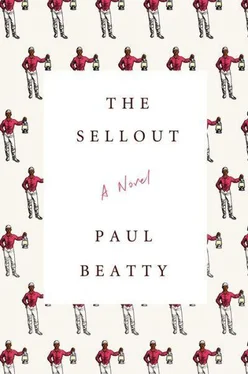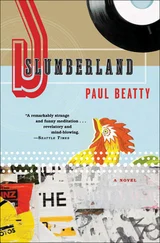Still, I don’t feel guilty. If I’m indeed moving backward and dragging all of black America down with me, I couldn’t care less. Is it my fault that the only tangible benefit to come out of the civil rights movement is that black people aren’t as afraid of dogs as they used to be? No, it isn’t.
The Marshal of the Court rises, pounds her gavel, and begins to incant the Court’s invocation: “The honorable, the Chief Justice and the Associate Justices of the Supreme Court of the United States.”
Hampton lifts me shakily to my feet, and we, along with all those in attendance, rise in ministerial solemnity as the Justices enter the courtroom, trying their level best to look impartial, with their Eisenhower-era hairstyles and “another day, another dollar” blank workaday expressions. Too bad it’s impossible not to come off as pompous when you’re wearing a silk black robe and the Negro Justice has absentmindedly forgotten to take off his $50,000 platinum Rolex. I suppose if I had better job security than Father Time, I’d be smug as a motherfucker, too.
Oyez! Oyez! Oyez!
At this point, after five years of endless decisions, reversals, appeals, postponements, and pretrial hearings, I don’t even know if I’m the plaintiff or the defendant. All I know is that the sour-faced Justice with the post-racial chronometer won’t stop looking at me. His beady eyes fixed in this unblinking and unforgiving stare, he’s angry that I’ve fucked up his political expediency. Blown up his spot like a little kid visiting the city zoo for the first time and, frustrated at having walked past cage after seemingly empty reptile cage, finally stops at an enclosure and shouts, “There he is!”
There he is, Chamaeleo africanus tokenus hidden way in the back among all the shrubbery, his slimy feet gripped tightly around the judicial branch in a cool torpor, silently gnawing on the leaves of injustice. “Out of sight, out of mind” is the black workingman’s motto, but now the entire country can see this one, our collective noses pressed to the glass in amazement that he’s been able to camouflage his Alabama jet-black ass against the red, white, and blue of the American flag for so long.
“All persons having business before the honorable, the Supreme Court of the United States, are admonished to draw near and give their attention, for the Court is now sitting. God save the United States and this honorable Court!”
Hamp kneads my shoulder, a reminder not to sweat the nappy-headed magistrate or the republic for which he stands. This is the Supreme Court, not the People’s Court. I don’t have to do anything. I don’t need copies of dry cleaner receipts, police reports, or a photograph of a dented bumper. Here the lawyers argue, the judges question, and I get to simply kick back and enjoy my high.
The Chief Justice enters the case. His dispassionate midwestern demeanor goes a long way toward easing the tension in the room. “We’ll hear argument first this morning in case 09-2606…” He pauses, rubs his eyes, then composes himself. “In case 09-2606, Me v. the United States of America .” There’s no outburst. Only giggling and eye rolling accompanied by some loud “Who this motherfucker think he is?” teeth sucking. I admit it, Me v. the United States sounds a little self-aggrandizing, but what can I say? I’m Me. Literally. A not-so-proud descendant of the Kentucky Mees, one of the first black families to settle in southwest Los Angeles, I can trace my roots all the way back to that first vessel to escape state-sanctioned southern repression — the Greyhound bus. But when I was born, my father, in the twisted tradition of Jewish entertainers who change their names and the uptight, underachieving black men who envy them, decided to truncate the family name, dropping that last unwieldy e like Jack Benny dropped Benjamin Kubelsky, Kirk Douglas — Danielovitch, like Jerry Lewis dropped Dean Martin, Max Baer dropped Schmeling, Third Bass dropped science, and Sammy Davis, Jr., dropped Judaism all together. He wasn’t going to let that extra vowel hold me back like it did him. Pops liked to say that he didn’t Anglicize or Africanize my surname, but actualized it, that I was born having reached my full potential and could skip Maslow, third grade, and Jesus.
Knowing that the ugliest movie stars, the whitest rappers, and the dumbest intellectuals are often the most respected members of their chosen profession, Hamp, the defense lawyer who looks like a criminal, confidently sets his toothpick on the lectern, runs his tongue over a gold-capped incisor, and straightens his suit, a baby-tooth-white, caftan-baggy, double-breasted ensemble that hangs on his bony frame like an empty hot-air balloon and, depending on your taste in music, either matches or clashes with his asp-black, Cleopatra chemical perm and the first-round Mike Tyson knockout darkness of his skin. I half expect him to address the court with “Fellow pimps and pimpettes, you may have heard that my client is dishonest, but that’s easy for them to say, because my client is a crook!” In an age where social activists have television shows and millions of dollars, there aren’t many left like Hampton Fiske, those pro-bono assholes who believe in the system and in the Constitution, but who can see the gap between reality and rhetoric. And while I don’t really know if he truly believes in me or not, I know that when he starts to defend the indefensible, it won’t make a difference, because he’s a man whose business card motto is “For the poor every day is casual Friday.”
Fiske has barely uttered “May it please the Court,” when the black Justice moves almost imperceptibly forward in his seat. No one would’ve noticed, but a squeaky wheel on his swivel chair gave him away. And with each referral to some obscure section of the Civil Rights Act or precedent-setting case, the Justice shifts impatiently, causing his chair to squeak louder and louder with each transfer of his restless body weight from one flabby diabetic butt cheek to the other. You can assimilate the man, but not the blood pressure, and the vein pulsating angrily down the middle of his forehead gives him away. He’s giving me that crazy, red-eyed penetrating look that back home we call the Willowbrook Avenue Stare, Willowbrook Avenue being the four-lane river Styx that in 1960s Dickens separated white neighborhoods from black, but now, post-white, post-anybody-with-two-nickels-to-rub-together-flight, hell lies on both sides of the street. The riverbanks are dangerous, and while standing at the crosswalk waiting for the light to change, your life can change. Some drive-by homie, representing some color, clique, or any one of the five stages of grief, can stick his gauge out the passenger-side window of a two-tone coupe, give you the Negro Supreme Court Justice glare, and ask, “Where you from, fool?”
The correct answer, of course, is “Nowhere,” but sometimes they don’t hear you over the loud, sputtering, unmufflered engine, the contentious confirmation hearing, the liberal media’s questioning of your credentials, the conniving black bitch accusing you of sexual harassment. Sometimes “Nowhere” just isn’t a good enough answer. Not because they don’t believe you, because “everybody’s from somewhere,” but because they don’t want to believe you. And now, having lost his veneer of patrician civility, this screw-faced magistrate, sitting in his high-backed swivel chair, is no different from the gangbanger cruising up and down Willowbrook Avenue calling and sitting “shotgun” because he has one.
And for the first time in his long tenure on the Supreme Court, the black Justice has a question. He’s never interjected before, so he doesn’t quite know how. Looking to the Italian Justice for permission, he slowly raises his puffy, cigar-fingered hand in the air, but too infuriated to wait for approval, he blurts out, “Nigger, are you crazy?” in a voice surprisingly high-pitched for a black man his size. Now void of objectivity and equanimity, his ham-sized fists pound the bench so hard the fancy, giant, gold-plated clock suspended from the ceiling above the Chief Justice’s head begins to pendulum back and forth. The black Justice moves in too close to his microphone, yelling into it, because although I’m seated only a few feet away from the bench, our differences are light-years apart. He’s demanding to know how it is that in this day and age a black man can violate the hallowed principles of the Thirteenth Amendment by owning a slave. How could I willfully ignore the Fourteenth Amendment and argue that sometimes segregation brings people together. Like all people who believe in the system, he wants answers. He wants to believe that Shakespeare wrote all those books, that Lincoln fought the Civil War to free the slaves and the United States fought World War II to rescue the Jews and keep the world safe for democracy, that Jesus and the double feature are coming back. But I’m no Panglossian American. And when I did what I did, I wasn’t thinking about inalienable rights, the proud history of our people. I did what worked, and since when did a little slavery and segregation ever hurt anybody, and if so, so fucking be it.
Читать дальше












